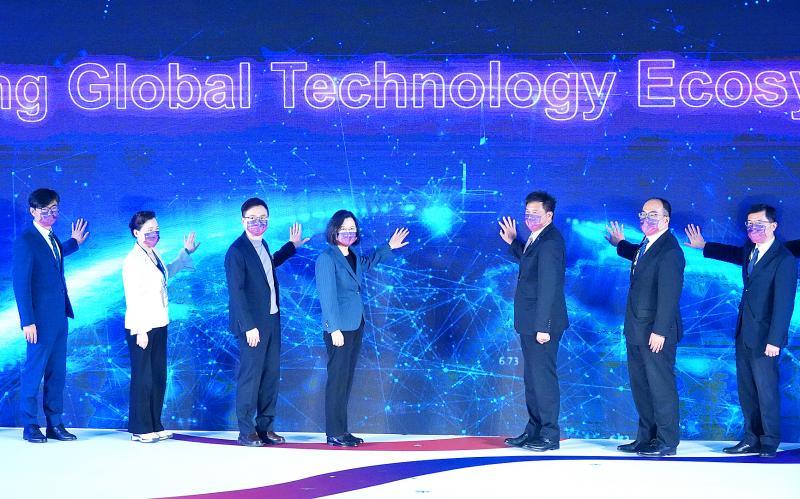The government will continue to work with the private sector to usher in a new “golden decade” for Taiwan’s technology industry, President Tsai Ing-wen (蔡英文) said yesterday at the opening of Computex at the Taipei Nangang Exhibition Center’s Hall 1.
The information and communications technology (ICT) sector will continue to play a major role in the advancement of economic development, and is also key to promoting the digital transformation of other industries, Tsai said in her opening remarks.
She also lauded the highly resilient and competitive semiconductor ecosystem the country has built over the past four decades, ranging from foundry and IC design to packaging and testing.

Photo: CNA
In the future, cutting-edge technologies, such as artificial intelligence and cloud computing, will be highly dependent on semiconductors, she said.
Taiwan must continue to leverage its strength in high-end hardware manufacturing so the ICT industry can further expand its applications into smart machinery and smart medical care, with the aim of making Taiwan’s economy more internationally competitive, she said.
The government will continue to work with the private sector to promote the nation’s digital transformation, drive economic development and usher in another golden decade for the country’s technology industry, Tsai said.
Organized by the Taiwan External Trade Development Council (TAITRA, 外貿協會) and the Taipei Computer Association (台北市電腦公會), Computex resumed its physical exhibition this year after a hiatus of two years. The event runs until Friday.
Alongside the physical show, the virtual Computer Cyberworld also opened yesterday and will run until June 30, TAITRA said, adding that about 400 foreign and local companies are showcasing their products at 1,000 booths at the two trade fairs.
A special online platform, Computex DigitalGo, has been set up to help connect an estimated 3,000 overseas buyers to Taiwanese suppliers, TAITRA said.

Stephen Garrett, a 27-year-old graduate student, always thought he would study in China, but first the country’s restrictive COVID-19 policies made it nearly impossible and now he has other concerns. The cost is one deterrent, but Garrett is more worried about restrictions on academic freedom and the personal risk of being stranded in China. He is not alone. Only about 700 American students are studying at Chinese universities, down from a peak of nearly 25,000 a decade ago, while there are nearly 300,000 Chinese students at US schools. Some young Americans are discouraged from investing their time in China by what they see

MAJOR DROP: CEO Tim Cook, who is visiting Hanoi, pledged the firm was committed to Vietnam after its smartphone shipments declined 9.6% annually in the first quarter Apple Inc yesterday said it would increase spending on suppliers in Vietnam, a key production hub, as CEO Tim Cook arrived in the country for a two-day visit. The iPhone maker announced the news in a statement on its Web site, but gave no details of how much it would spend or where the money would go. Cook is expected to meet programmers, content creators and students during his visit, online newspaper VnExpress reported. The visit comes as US President Joe Biden’s administration seeks to ramp up Vietnam’s role in the global tech supply chain to reduce the US’ dependence on China. Images on

New apartments in Taiwan’s major cities are getting smaller, while old apartments are increasingly occupied by older people, many of whom live alone, government data showed. The phenomenon has to do with sharpening unaffordable property prices and an aging population, property brokers said. Apartments with one bedroom that are two years old or older have gained a noticeable presence in the nation’s six special municipalities as well as Hsinchu county and city in the past five years, Evertrust Rehouse Co (永慶房產集團) found, citing data from the government’s real-price transaction platform. In Taipei, apartments with one bedroom accounted for 19 percent of deals last

US CONSCULTANT: The US Department of Commerce’s Ursula Burns is a rarely seen US government consultant to be put forward to sit on the board, nominated as an independent director Taiwan Semiconductor Manufacturing Co (TSMC, 台積電), the world’s largest contract chipmaker, yesterday nominated 10 candidates for its new board of directors, including Ursula Burns from the US Department of Commerce. It is rare that TSMC has nominated a US government consultant to sit on its board. Burns was nominated as one of seven independent directors. She is vice chair of the department’s Advisory Council on Supply Chain Competitiveness. Burns is to stand for election at TSMC’s annual shareholders’ meeting on June 4 along with the rest of the candidates. TSMC chairman Mark Liu (劉德音) was not on the list after in December last